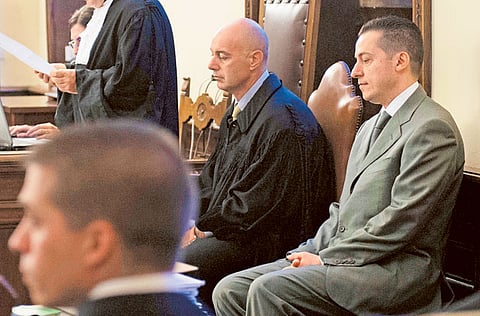Trial of Pope Benedict XVI's butler opens: Vatican
Trial against Pope Benedict XVI's former butler opened on Saturday

Vatican City: Pope Benedict's former butler, Paolo Gabriele, went on trial on Saturday for one of the most embarrassing episodes in recent Vatican history.
The trial of the 46-year-old man who served the pope his meals and helped him dress began at 9:30 a.m. (0730 GMT) in the Vatican's little-used tribunal, a small room with rich panelled wood and a papal emblem on its ceiling.
He was arrested in May after police found confidential documents in his apartment inside the Vatican, a dramatic twist that threw the global media spotlight on an institution battling to defend its reputation from allegations of graft.
A three-judge panel will decide the fate of Gabriele, whom the pope used to call "Paoletto" (little Paul) and who is now described in Vatican documents as "the defendant".
Gabriele stands accused of stealing the pontiff's personal papers and leaking them to the media in what he says was an attempt to clean up corruption at the headquarters of the Roman Catholic Church.
A group of eight journalists were allowed into the courtroom and were due to brief other reporters after the end of the first session, which was expected to last up to three hours.
According to an indictment last August, Gabriele told investigators he had acted because he saw "evil and corruption everywhere in the Church" and wanted to help root it out "because the pope was not sufficiently informed".
The documents pointed to a power struggle at the Church's highest levels.
Gabriele, who said he saw himself as a whistle-blowing "agent of the Holy Spirit", is widely expected to be convicted on charges of aggravated theft because he has confessed.
"He has done harm by leaking this information because there will always be somebody who will take advantage of these things to denigrate the Church," said Rome resident Sergio Caldari in Saint Peter's Square.
Another local onlooker, Giovanni Maisto, said he was hopeful that the trial could mark "a new dimension of openness and transparency" in the Church's affairs.
The trial procedures will be based on a 19th century Italian penal code and could result in a prison sentence of up to four years for Gabriele and one year for Claudio Sciarpelletti, a computer expert charged with aiding and abetting him.
Corruption allegations
It is not clear how long the trial might last.
Gabriele, a father of three who lived a simple but comfortable life in the city-state, told investigators after his arrest in May that he believed a shock "could be a healthy thing to bring the Church back on the right track".
His arrest capped nearly five months of intrigue and suspense after a string of documents and private letters found their way into the Italian media.
The most notorious of the letters were written to the pope by Archbishop Carlo Maria Vigano, currently the Vatican's ambassador to Washington, who was deputy governor of Vatican City at the time.
In one, Vigano complains that when he took office in 2009, he discovered corruption, nepotism and cronyism linked to the awarding of contracts to outside companies at inflated prices.
Vigano later wrote to the pope about a smear campaign against him by other Vatican officials who were upset that he had taken drastic steps to clean up the purchasing procedures.
Despite begging not to be moved away from the Vatican, Vigano was later transferred to Washington by Secretary of State Cardinal Tarcisio Bertone, effectively the Vatican's prime minister.
Since the papal state has no prison, Gabriele would serve time in an Italian jail, though the pope is widely expected to pardon him.



